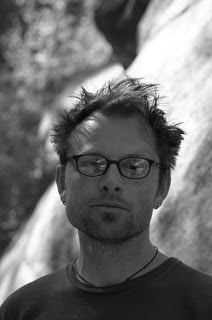Hallelujah Blackout, Milkweed Editions, 2008.
Alex Lemon’s first collection, Mosquito, was published by Tin House Books. He has received grants from National Endowment for the Arts and from the Minnesota Arts Board. He is the co-editor of LUNA: A Journal of Poetry and Translation and is a frequent contributor to The Bloomsbury Review. He lives in Fort Worth, TX, and teaches at Texas Christian University.
Mosquito, published in 2006, is as compressed and tiny (in dimensions, not in scope or word power) as its namesake. Hallelujah Blackout is unusually thick (at 144 pages) for a poetry collection. What informed the shift from one side of the scale to the other extreme? How was writing and constructing this project a different experience from the first?
I think Hallelujah Blackout is the size it is because I needed that space to begin expanding the scope of my poetics. For me there is a real freedom in the new book. I think this was cultivated by a new self reliance, stemming in part from movement in my life—through personal space and geography. I also felt a radical need to shift the focus of the poems away from something so closely tethered to one specific experience or narrative (my illness).
Mosquito was tightly wrought, or felt that way to me, because many of the poems came out of my MFA experience at the University of Minnesota. I had a wonderful time there, but it was really about learning about poetry through other voices—teachers and books—and only starting to learn about myself. In many ways, those poems feel straitjacketed (which is not necessarily a bad thing), but the new book has a sense of unrestrained tumult to it, which I like.
I watched a lot of Olympics the last month. I think of it this way. Mosquito was like the hundred meter dash. Hallelujah Blackout is the 1600 meters, but you’re running through the streets of New York. At night. You’re being chased by people and animals and cars are swerving at you. Objects, maybe even shards of the sky, are falling from the heavens.
The energetic journey in this book refuses to let the dust settle and the reader is constantly on the go, stimulated by the persistent use of surprising language, syntax and imagery. Indeed, there is little respite for either speaker or listener—it’s the furious music that keeps everyone awake. In particular, that stunning poem “Abracadaver,” with its “mouthfuls of tarantula pudding” and the whimpering of the “midnight sparrows,” is relentless in its execution. What informs such frenzy and urgency (perhaps even madness) in this book?
As a writer, I’m always collecting scraps of the world. I love old dictionaries and bird guides, science texts and books of contemporary philosophy, hummingbird feeders and political speeches. I’m in the process of learning what I’m going to be able to grow in the garden here in Texas. I watch movies: documentaries and non-linear foreign films and juvenile comedies. I collect all types of music (I’ve been listening to a lot of Alan Lomax recordings and have recently been unearthing some CDs I was listening to in high-school—Danzig, Los Lobos, The Doors). I’m also very interested in the sounds of the day—and have always recorded parts of my hours or listened to random recordings on the internet—and spend an hour a day listening to the world: bits of conversation, car honks, and the firemen endlessly washing their trucks down the block.
The multiple nuances of the title give the reader some direction—religious ecstasy, passion, fervor, or the spirit seizures that elevate the self toward a fresh consciousness. But to use words like “epiphany” and “prayer” is too abstract of an approach to understand a book that’s as visceral and sensory as Hallelujah Blackout. In fact, your language is more body than soul, more flesh than spirit—even “emergencies” are described as “barbed and luminous.” Why is the body such an important vessel, messenger and trope in your work?
From a very young age, I was interested in the limits of the body—especially in sports. Growing up, I tried everything—football, wrestling, basketball, even cheerleading—and I played baseball through college. Because of artists in my family, I’ve always been interested in the artistic and aesthetic qualities of the body. Through college and graduate school, I became more drawn to the sciences, especially neuroscience and physics. As I grow older, I tend to be more invested in the spiritual side of physicality. But most of all, as a young man I was faced with my own mortality and had to radically change the relationship I had to my body. Since my surgery, I live with a visual disability, a poor vestibular system and chronic nerve and muscle pain. The body I now inhabit is very different from the one I had before my brain started bleeding, and I can no longer do many things I used to enjoy—like baseball or pottery. Even reading, at times, is a challenge. I still seek out the limits of my body through healthy physical sensation, especially through running. To me, the body is pressing, literally and figuratively.
(Author Photo Credit: Ariane Balizet )


